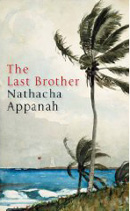

Quercus Publishing, hardcover, 9781847246417
When David comes to him in a dream, Raj, now an old man, is transported back to his childhood over 60 years earlier, to a few months which were to mark his life for ever.
Mauritius, 1945. Nine-year old Raj is oblivious to the ravages of the Second World War, although his own short existence has been full of more personal horrors, his life having changed irretrievably several years earlier when both his older and younger brothers died in a landslide which he survived. Crazy with grief and desperate to leave the scene of the deaths, his father got a job as a prison guard and moved what remained of his family to another part of the island, in the middle of the forest. Raj has been left to cope alone not only with the loss of his beloved brothers, but also with the guilt he feels at being the one to survive, and the idea that his father would have preferred either of his other sons to have lived. Meanwhile, his father retreats into alcohol and violence, and Raj and his mother live in fear of him.
Lonely Raj spends much of his time spying on his father from his hiding place in the forest on the other side of the prison fence. It's from here that he first sees David, and everything changes. Raj the old man knows that David was Jewish, part of a shipment of Jews interned on Mauritius during the war, having been refused entry to Palestine (a real event). He also knows that the orphaned David (his parents died during the voyage) was seriously ill. What Raj the child sees, though, is a kindred spirit, a friend, a brother to replace those he has lost, and it only takes one look to see that David sees the same in him. Raj decides that he has to rescue David, and the two boys, one as dark as the other is fair, embark upon a heartbreaking journey which can only end in tragedy.
The friendship between the two boys is beautifully portrayed. They have no common language, nor do they need one, for they understand each other perfectly. This is the kind of unquestioning friendship which comes along once in a lifetime if you are lucky, and the increasingly sick David's total faith in Raj is as touching as it is misplaced. Two damaged little boys, they fit together perfectly, each offering the other what he so badly needs. Even though we know right from the start that it's not going to be happy, the ending, when it comes, is shocking and stark.
Nathacha Appanah convincingly pulls off both the voice of Raj the old man and that of Raj the child. She successfully combines the two voices, the old man wise with the benefit of hindsight, and the naïve child; the old man's acceptance of how much harm he caused with that naivety is one of the most touching parts of the book. I also admire Appanah's refusal to fall into pathos; the potential is certainly there for this to have become a huge, slushy, sentimental novel, but instead it's gentle and controlled, and all the more effective for it. It's also incredibly atmospheric; I could feel the forest floor underfoot as I hacked my way through the bushes with the boys, hearing the same birds, seeing the same vivid colours, feeling the same mounting desperation.
I haven't felt this excited about the discovery of a new writer for a long time,
and I can't wait to sample more of Appanah's work, starting with Blue Bay Palace,
the English translation of which was published last year.
Download this page as a pdf